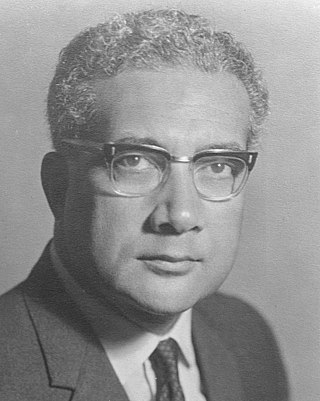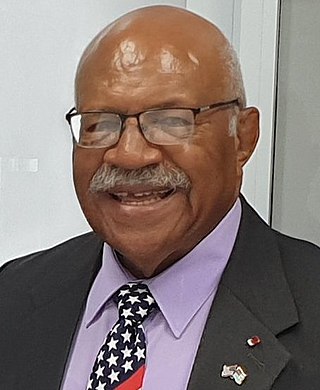
The politics of Fiji take place within the framework of a parliamentary representative democratic republic. Fiji has a multiparty system with the Prime Minister of Fiji as head of government. The executive power is exercised by the government. Legislative power is vested in both the government and the Parliament of Fiji. The judiciary is mostly independent of the executive and the legislature.

Ratu Sir Kamisese Mara, was a Fijian politician, who served as Chief Minister from 1967 to 1970, when Fiji gained its independence from the United Kingdom, and, apart from one brief interruption in 1987, the first Prime Minister from 1970 to 1992. He subsequently served as President from 1993 to 2000.

Brigadier-General Ratu Epeli Nailatikau, is a Fijian chief who was President of Fiji from 2009 to 2015. He has had a long career in the Military, diplomatic service, and government. From 2001 to 2006 he served as Speaker of the House of Representatives – the lower and more powerful chamber of the Fijian Parliament. He was also the chairman of the Parliamentary Appropriations Committee and of the House Committee. On 8 January 2007, he was appointed the interim Minister for Foreign Affairs and External Trade; he was moved to the post of interim Minister for Provincial Development and Multi-Ethnic Affairs in September 2008. In October 2008, he became Indigenous Affairs Minister "and effectively Great Council of Chiefs chairman". On 17 April 2009, he was appointed Vice-President by the military government.

The prime minister of Fiji is the head of government of the Republic of Fiji. The prime minister is appointed under the terms of the 2013 Constitution. The prime minister is the head of the Cabinet and appoints and dismisses ministers.

The Great Council of Chiefs is a Fijian constitutional body. It previously existed from 1876 to March 2012 and was re-established in May 2023.

The 1997 Constitution of Fiji was the supreme law of Fiji from its adoption in 1997 until 2009 when President Josefa Iloilo purported to abrogate it. It was also suspended for a period following the 2000 coup d'état led by George Speight.

Sitiveni Ligamamada Rabuka is a Fijian politician, former soldier and former sportsman who has served as Prime Minister of Fiji since 24 December 2022. He was the instigator of two military coups in 1987. He was democratically elected as Prime Minister of Fiji, serving from 1992 to 1999, and again in 2022, leading a three-party coalition. He also served as Chairman of the Great Council of Chiefs from 1999 to 2001, and later as Chairman of the Cakaudrove Provincial Council from 2001 to 2008.

The Fijian coups d'état of 1987 resulted in the overthrow of the elected government of Fijian Prime Minister Timoci Bavadra, the deposition of Elizabeth II as Queen of Fiji, and in the declaration of a republic. The first coup d'état, in which Bavadra was deposed, took place on 14 May 1987; a second coup d'état on 25 September ended the monarchy, and was shortly followed by the proclamation of a republic on 10 October. Both military actions were led by Lieutenant Colonel Sitiveni Rabuka, then third in command of the Royal Fiji Military Forces.

Since attaining independence from the United Kingdom on 10 October 1970, Fijian history has been marked by exponential economic growth up to 1987, followed by relative stagnation, caused to a large extent by political instability following two military coups in 1987 and a civilian putsch in 2000. This was followed by another military coup in 2006. Rivalry between indigenous Fijians and Indo-Fijians, rather than ideological differences, have been the most visible cleavage of Fijian politics. Later in 2020, Fiji was hit by the global COVID-19 pandemic, which affected the economy and the daily lives of the people.

The Reconciliation and Unity Commission was a proposed government body to be set up if the Reconciliation, Tolerance, and Unity Bill, which was introduced into the Fijian Parliament on 4 May 2005 was passed. The legislation proposed to empower the commission to grant amnesty to perpetrators of the Fiji coup of 2000, and compensation to victims of it from 19 May 2000 through 15 March 2001. The Fijian President would retain a veto over the granting of amnesty.

The Fijian coup d'état of December 2006 was a coup d'état in Fiji carried out by Commodore Frank Bainimarama, Commander of the Republic of Fiji Military Forces (RFMF), against Prime Minister Laisenia Qarase and President Josefa Iloilo. It was the culmination of a political crisis that started the previous year, when the Qarase government introduced three bills to the Fijian Parliament. The Qoliqoli, Land Tribunal, and Reconciliation, Tolerance, and Unity Bills dealt with the ongoing ethnic conflicts in Fiji and the aftermath of the 2000 coup, and were considered to be pro-ethnic Fijian. Bainimarama presented the government with a list of demands on October 16 that included withdrawing the bills. Attempts at negotiation failed and the military launched the coup on 4 December. Parliament was dissolved, Qarase and his cabinet were dismissed, and some civilian officials were placed under house arrest. After the Great Council of Chiefs refused to appoint a cabinet friendly to the military, Bainimarama reached an understanding with Iloilo and reinstated him as President on 4 January 2007. Iloilo then appointed Bainimarama acting Prime Minister in charge of the Interim Cabinet.
The People's Charter for Change, Peace and Progress was a proposed legal document which would have complemented the 1997 Constitution of Fiji. It would have established compulsory guidelines for any government policy in Fiji over the coming years. The People's Charter was due to be completed and come into force prior to the scheduled 2014 general election.
In April 2009, Fiji underwent a constitutional crisis when the Court of Appeal ruled that the 2006 Fijian coup d'état had been illegal. The Court dismissed the Interim Cabinet led by Prime Minister Frank Bainimarama that had governed Fiji since the coup. However, President Josefa Iloilo announced on a nationwide radio broadcast that he was abrogating the Constitution. He dismissed all judges and constitutional appointees, and reinstated Bainimarama and his cabinet. He also instituted emergency rule which increased police powers and allowed media censorship.

Ratu Josefa Iloilovatu Uluivuda, was a Fijian politician who served as the 3rd President of Fiji from 2000 until 2009, excluding a brief period from 5 December 2006 to 4 January 2007. He held the traditional title of Tui Vuda, the paramount chief of the Vuda district in Ba Province on Fiji's northwest coast. Like many Fijian people, he rarely used his surname and was known simply as Josefa Iloilo. He announced on 28 July 2009 that he would be leaving office on 30 July. At the age of 88, he was the world's oldest head of state.

Fiji is an island nation in Melanesia in the South Pacific Ocean with a population of approximately 849,000. It is made up of Fijians, Indo-Fijians, Europeans, Chinese, other Pacific islanders, and people of mixed racial descent. Fiji has been in a state of political unrest since their independence from Britain in 1970.

Fiji's fourth constitution, the 2013 Constitution of Fiji, was signed into law by President Ratu Epeli Nailatikau on 6 September 2013, coming into effect immediately. It is the first to eliminate race-based electoral rolls, race-based seat quotas, district-based representation, the unelected upper chamber, and the role of the hereditary Council of Chiefs. It vests sole legislative authority in a single-chamber, 50-seat, at-large Parliament, to be first convened following general elections in 2014. It is also the first ever to grant the right to multiple citizenship, and lowers the voting age to 18.
The Electoral Commission is an independent statutory body responsible for conducting elections in Fiji. It is also responsible for registering Fijian voters, political parties and candidates for elections.

Republic of Fiji Islands v Prasad is a 2001 landmark decision of the Court of Appeal of Fiji which upheld the 1997 Constitution of Fiji in the aftermath of the 2000 Fijian coup d'état. The court agreed with the previous High Court of Fiji ruling that the constitution had not been overturned and that Parliament had not been dissolved, but only prorogued. It also found that the office of President of Fiji had only become vacant in December 2000 after Kamisese Mara resigned following the High Court ruling.








